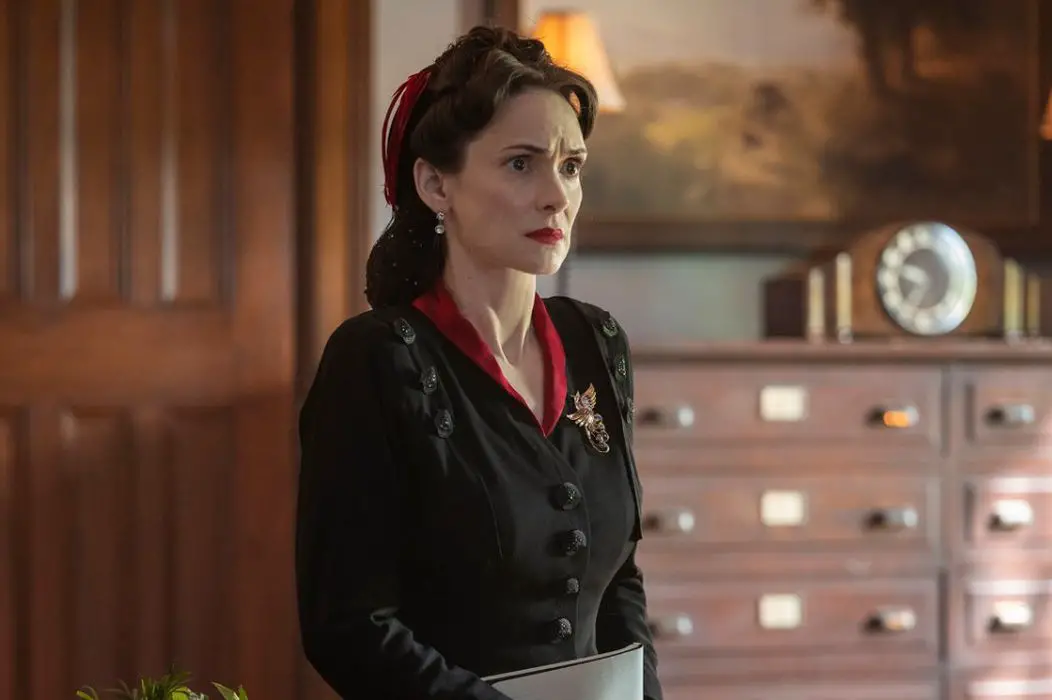THE PLOT AGAINST AMERICA “Part 6”: A Perfect Ending To A Perfect Series

Digital Media Program Coordinator and Professor at Southern Utah University…
“Freedom can be lost and lost quickly, and all you have to do is stop fighting for it.” – David Simon, interview with Slate, April 20, 2020
The word “perfect” seems to get thrown around a little too much, especially considering what the word implies. For a show to be perfect, every shot, every performance, every line, every nuance, every tiny thing has to be not only perfectly prepared, but perfectly executed, and perfectly balanced as a story. Considering that tall order, perfection is something that obviously does not happen every day. So trust me when I say, rarely has the word been more appropriately used than in describing David Simon and Ed Burns’ brilliant The Plot Against America.
Episode Summary
September 1942. Violence borne of partisan rivalry is on the rise. Democratic presidential candidate Walter Winchell is attacked at one of his rallies. Protests and counter-protests continue to devolve into riots. At a subsequent rally, Winchell is assassinated, and the country descends into chaos. All the while, President Lindbergh (Ben Cole) remains silent, despite Bengelsdorf’s consistent appeal that he make some kind of public statement to ease the tension.
The Levin family desperately tries to stay safe as all around them, Jewish businesses are burned by hateful oppressors, with law enforcement standing just a few feet away, but refusing to intervene. Alvin (Anthony Boyle) is approached by an underground resistance movement, and ends up being an unwitting participant, or so he suspects, in bringing down the President’s plane.

With Lindbergh missing, the country devolves further into hate-fueled violence, as rumors and accusations fly. At the word of Secretary Henry Ford, Bengelsdorf (John Turturro) is arrested on the trumped-up charge of conspiring against the government. First Lady Anne Morrow Lindbergh (Caroline Kaplan) is taken into unlawful captivity, with the public being fed a story that she’s bedridden with grief. Only when she is released by loyal supporters of Lindbergh’s administration does she speak out against the violence, calling for a new election to be held in November. Finally, the violence subsides, and the country begins to return to some semblance of normality, but never to be the same again.
Flawless Execution
Similar to Philip Roth’s novel, the character of young Philip is masterfully used throughout the series as a vessel through which we see changes in the family, as well as in the country at large. Because Philip is so young, we relate to the familiar fears we ourselves experienced in childhood. Further, we see the chaos Philip sees, experiencing it without the filter that naturally develops as we grow older.
In each of the series’ six episodes, Philip’s experiences make the story’s alternate reality feel viscerally real. Viewers are naturally required to suspend disbelief with any fictional story, but The Plot Against America takes it one step further by also requiring us to suspend our long-cherished protective filters. Simon and Burns use the viewpoint of an innocent child to ask their audience to tear down, brick by brick, the walls we’ve built up around our hearts.
In Part 6, Philip (Azhy Robertson) is forced to reconcile the balance between his own needs, and the needs of others. Philip was the only friend to young Seldon Wishnow (Jacob Laval), recently relocated to Kentucky with his mother as part of the “Homestead 42” program. Indeed, Philip is at least partially responsible for the Wishnows being forced to move: Evelyn (Winona Ryder), having already put the Levin family down for relocation to Kentucky, felt that it would be easier on Philip if his friend moved there as well. When Herman (Morgan Spector), decided to defy the order, Seldon and his mother ended up in Kentucky while the Levins stayed behind in New Jersey. Over the course of the episode, we learn that Seldon’s mother has been killed by members of the Ku Klux Klan. Herman and Sandy (Caleb Malis) go to collect the boy, and experience another level of hate-fueled terror in the southern state.
Forced to reconcile his actions and their effect on others, Philip learns the critical importance of tact throughout this episode, including when it may be necessary to be less than truthful in order to further what’s most important in a critical situation. Perhaps the harshest lesson comes in the form of broken bonds between his mother and her sister. Evelyn comes to the Levin’s home after Bengelsdorf’s arrest, desperately looking for help and shelter. As Philip watches, Bess turns the desperate woman away. She chooses to put the safety of her family above that of her sister, and has little choice but to do so, as Evelyn has shown time and again her disdain for Bess’ opinion in regards to her family’s safety. “I will always love you,” Bess says to her sister, “but I will never forgive you.” Evelyn calls after her, insisting, even with mounting evidence to the contrary, that she didn’t do anything wrong. Bess remains silent as she walks away.

The performances throughout the series are top-notch, but Zoe Kazan takes it to a different level in this finale. One scene in particular stands out as worthy of all accolades. As Bess tries to comfort Seldon over the phone in the middle of the night, Kazan delivers a masterclass in acting. Seldon is panicked, terrified that his mother has not returned from work, and hasn’t called. “She’s dead, I know she is,” he keeps repeating. Bess clearly fears that such may be the case, but must reconcile her own fears with that of a panicking child, and the sense of obligation she feels to help him. She tries to explain that his mother may have simply been delayed, telling the boy that it’s okay.
She moves as she talks, as though she’s rocking him back and forth, trying desperately to keep the panic out of her own voice. Then, she hears a gunshot outside her window. Then another. Her panic rising, she has to fight to keep her voice calm as she continues to try and help Seldon. Throughout the entire scene, the camera simply holds in a low angle full shot. It’s a masterful moment, and only one of many throughout The Plot Against America.
“Freedom can be lost, and lost quickly.”
Throughout The Plot Against America, there is no single “bad guy.” There’s no definite hero, nor villain in the traditional sense. Instead, the characters are simply human. The show is careful not to make one man’s opinion the focus. While the opinion of the President, of course, carries weight, that opinion is not what leads to unrest. Instead, it is the assumed approval of long-held beliefs on the part of everyday citizens; in short, confirmation bias.
The danger of confirmation bias is, always has been, and always will be, that people find what they’re looking for. If they want to see approval for racism in the actions or words of a leader, that’s what they will find. And if they want to see a denouncement of racism in those exact same words and actions, that’s what they will find. In the end, the danger is not one person, or any group of people, no matter how powerful. In the end, the true danger is the perpetuation of regressive ideas through a lack of exposure and education.

The show concludes with an incredible snapshot, a scene that perfectly reflects modern America, as the country goes to the polls to elect a new president on November 3, 1942. As we hear Frank Sinatra sing “The House I Live In”, we see the best and worst of our country. We see hope in people campaigning, greeting one another, different genders, religions, races participating. Then, we see despair as ballots are stolen and burned. Back and forth, we see progress, then regress.
The final shot tracks across the Levin family, sitting in their living room, awaiting the election results over the radio. Slowly, the camera dolly’s into a close up on the radio, as the announcer explains that so far, the results are too close to call. Cut to black. Why? Why end on such a note, with no election result? Because that would be against the whole point of the show. The Plot Against America is not asking us to simply elect the “right” people. Instead, it’s asking us to make real, lasting change. Racism, hatred, fear, or whatever issue is currently “hot” doesn’t get resolved with an election. New leadership doesn’t suddenly bring about major change. That’s up to us. In a democracy, leadership is meant to represent; the people decide. As one of the people, my voice should matter. So should yours. So what do you say? Is it finally time to move past hate?
As Alvin said during a shouting match with Herman toward the end of the episode, how much longer are we going to sit and wait for something to come and change things, be it divine intervention or whatever else? As so many (I’m guilty of this as well) talk about the next election as if it’s going to suddenly fix everything, repeating the chant of vote vote vote, David Simon and Ed Burns deliver with this series a scathing rebuke of our apathy. Act now. Stop waiting. The election is only a small part of rooting out evil. Put your money, and your action, where it counts. Join the movement… now.
“My father, to quote him again – we were having trouble with coming up with a line for the one-sheet. And we tried a bunch of stuff, some of it was a little bit too much on the money, some of it was a little bit too abstract. And the one that eventually we went with is something that my father used to say at every Passover Seder… On this liberation-themed holiday, my father used to say that democracy, and freedom, by extension, can never be completely won. Every day is a quotidian struggle. Every day you have to kill a few snakes. Every day you have to fight to try to extend the premise of freedom to a few more people, to those cohorts that are the most beleaguered. You’re never going to finish the job. There’s never a moment where you dust off your hands and say, ‘Well, there it is. That’s our republic. It’s perfected.’ It’s struggle. It’s the hardest form of government there is, is to attempt self-governance, and it’s utterly imperfect. But freedom can be lost and lost quickly, and all you have to do is stop fighting for it. You have to stop working, you have to stop killing snakes. He said it every year to us. And I don’t think I ever understood the complexity of what he was trying to say, until I lived through these last three years.” – David Simon, interview with Slate, April 20, 2020
The Plot Against America: Part 6 aired on April 20th, 2020, on HBO. The series is currently available to stream on HBO NOW and HBO GO.
Does content like this matter to you?
Become a Member and support film journalism. Unlock access to all of Film Inquiry`s great articles. Join a community of like-minded readers who are passionate about cinema - get access to our private members Network, give back to independent filmmakers, and more.
Digital Media Program Coordinator and Professor at Southern Utah University and Southwest Technical College; M.Ed.; Author at Labyrinth Learning and Film Inquiry. Passionate educator of film theory and history. World-class nerd with a wide array of interests and a deep love for many different fandoms.













